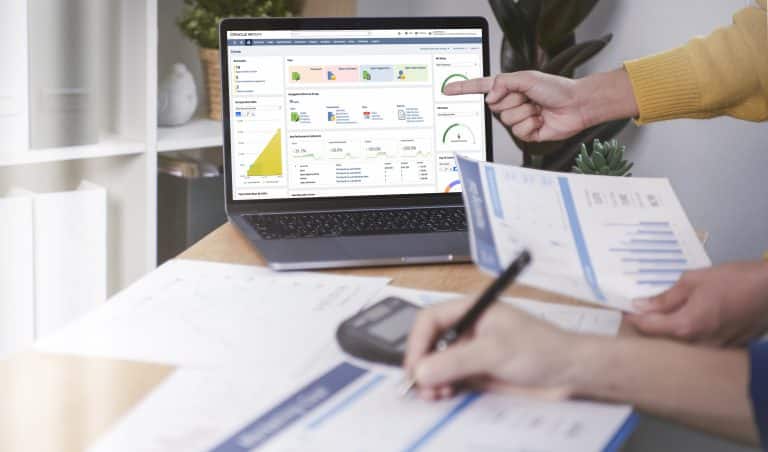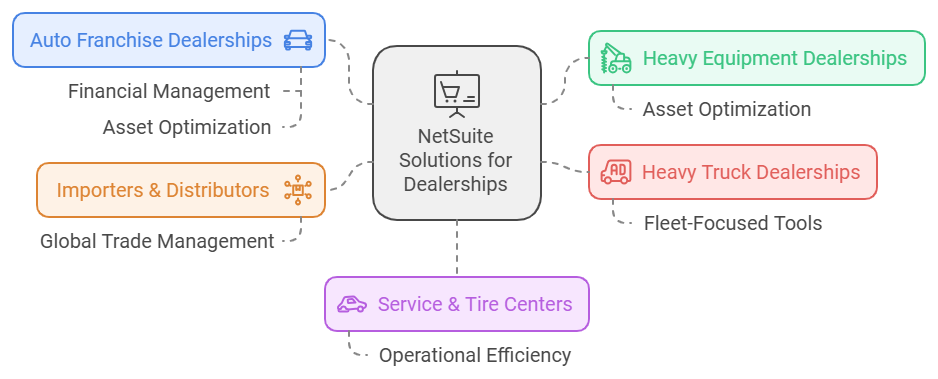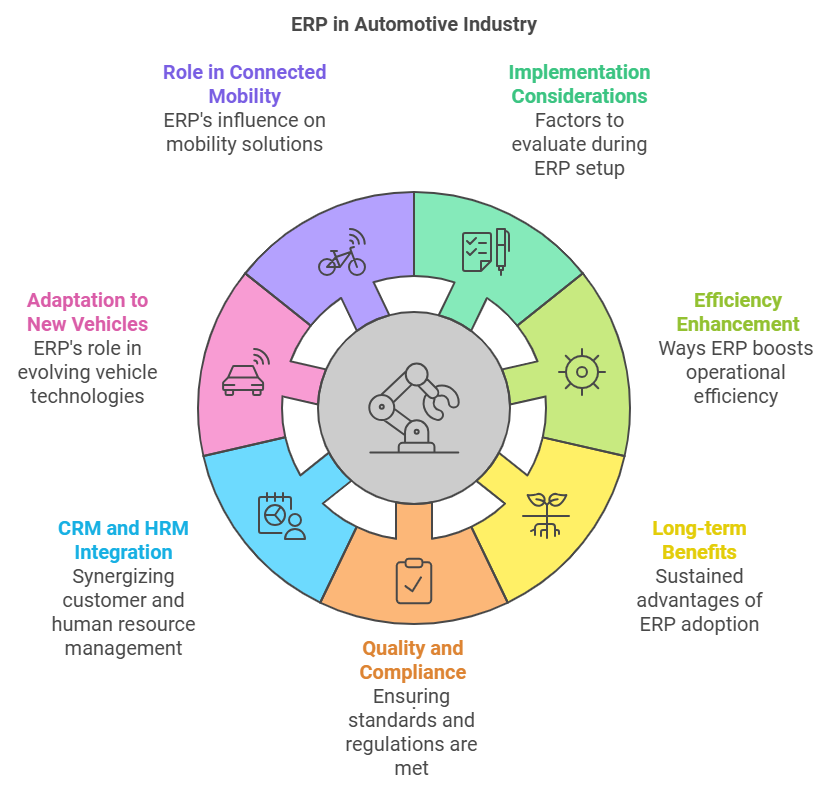
Overview on NetSuite for Automotive
The automotive industry is evolving at lightning speed, fueled by advancements in technology and ever-changing customer expectations. In this competitive landscape, businesses need more than traditional tools—they need systems that can adapt, scale, and optimize every aspect of their operations.
That’s where NetSuite for Automotive comes into play—a game-changing solution designed to unify and streamline your entire business, from supply chain management to financials and customer engagement. This powerful platform offers the agility and insights you need to stay ahead of the curve, ensuring efficiency and innovation at every turn.
In this blog, we’ll delve into the modules, functionalities, and benefits of NetSuite for Automotive, uncovering how it transforms business operations and empowers companies to thrive in an increasingly dynamic market.
What is Automotive ERP?
ERP solutions for the automotive industry are built to streamline and optimize the intricate manufacturing processes that define this sector. These versatile systems integrate multiple operational facets into a single cohesive platform, ensuring seamless alignment across all departments. Picture having a comprehensive overview of your entire manufacturing operation, coupled with the capability to dive into specific details with pinpoint accuracy—that’s the power of an automotive ERP.
Why is ERP Essential for Automotive Manufacturing?
ERP plays a vital role in automotive manufacturing by streamlining operations and enhancing the management of production schedules, inventory, and resource allocation. It helps prevent issues like overstocking or underproduction, ensuring an optimized manufacturing cycle. Additionally, ERP systems aid in meeting regulatory compliance and strengthening quality assurance processes, making them indispensable for efficient and reliable automotive production.
NetSuite for Automotive Dealerships and Service Providers: Solutions

Streamlined Operations for Auto Franchise Dealerships
Franchise dealerships require seamless coordination between manufacturers and retail outlets. NetSuite equips these businesses with tools to manage inventory across multiple locations, automate sales reporting to manufacturers, and track customer preferences for better upselling opportunities. Additionally, integrated financial and CRM tools provide franchise owners with a complete view of operational performance.
Comprehensive Financial Tools for BHPH & LTO Auto Dealerships
For BHPH and LTO dealerships, managing customer financing is critical. NetSuite simplifies loan and lease tracking, payment collection, and credit risk assessments. Its CRM module ensures dealerships maintain detailed customer profiles, including payment histories, ensuring a smoother and more transparent experience for buyers and sellers.
Optimized Asset and Service Management for Heavy Equipment Dealerships
Heavy equipment dealerships deal with high-value, complex machinery such as excavators, bulldozers, and cranes. NetSuite provides specialized asset tracking, service schedule management, and parts inventory tracking. Dealers can also manage extended warranties, leasing options, and regulatory compliance efficiently through an integrated platform.
Fleet-Centric Solutions for Heavy Truck Dealerships
Heavy truck dealerships require tools to manage intricate supply chains and maintenance needs. NetSuite helps streamline inventory for truck parts, track repair schedules, and optimize customer relationships. It also supports financing operations for fleet purchases and integrates with telematics systems to monitor vehicle performance and service needs.
Integrated Global Trade Management for Importers & Distributors
Importers and distributors in the automotive industry face unique challenges, including customs regulations, currency fluctuations, and global supply chain logistics. NetSuite’s multi-currency and multi-location inventory management modules provide importers with real-time visibility into stock levels, order statuses, and profit margins, ensuring efficient and compliant operations.
Enhanced Efficiency for Service & Tire Centers
Service and tire centers must juggle parts inventory, customer appointments, and specialized service requirements. NetSuite’s scheduling tools streamline appointment booking and resource allocation. Meanwhile, integrated inventory management ensures that tire sizes, oils, filters, and other essentials are always in stock. The CRM system allows businesses to send reminders for routine services, increasing customer retention.
Why Choose NetSuite for Automotive?
NetSuite is a comprehensive ERP solution tailored for the automotive industry, catering to manufacturers, distributors, and service providers. It streamlines operations with specialized modules for production, inventory, and quality management, while providing real-time visibility for informed decision-making. Scalable and cloud-based, NetSuite supports business growth, whether adapting to innovations like electric vehicles or expanding into new markets. Its unified platform fosters collaboration across departments, and robust analytics deliver actionable insights into performance and customer behavior. Trusted by leading automotive companies, NetSuite empowers businesses to overcome industry challenges, drive innovation, and achieve lasting success.
NetSuite for Automotive ERP Modules
NetSuite for Automotive empowers companies to unify their operations, enhancing efficiency and decision-making. From financial management to inventory, production, and customer engagement, its tailored modules address the unique needs of the automotive industry.

1.Inventory Management for Automotive Parts
2. Comprehensive Vehicle Lifecycle Management
NetSuite’s Automotive ERP modules provide tools to track and manage the entire vehicle lifecycle, from manufacturing to sales, servicing, and eventual disposal. This holistic view helps businesses optimize processes and improve customer satisfaction.
3. Demand Forecasting for Automotive Trends
NetSuite leverages advanced analytics to help automotive businesses predict market demands. Whether it’s seasonal trends or shifts in consumer preferences, the system supports accurate forecasting, enabling better decision-making for production and inventory strategies.
4. Enhanced Dealer and Supplier Collaboration
The automotive industry relies heavily on robust dealer and supplier networks. NetSuite’s centralized platform facilitates seamless communication, order management, and performance tracking with all stakeholders, ensuring smooth operations across the supply chain.
5. Real-Time Financial Insights and Reporting
Automotive businesses often juggle multiple revenue streams, from retail sales to service and parts. NetSuite provides real-time financial visibility, automating reporting processes and ensuring compliance with industry-specific regulations, helping businesses manage profitability effectively.
6. Warranty and Recall Management
NetSuite streamlines warranty tracking, enabling automotive businesses to manage claims for drivetrain warranties or coverage on hybrid battery replacements. Additionally, the system simplifies recall management by identifying affected VINs, notifying customers, and tracking service actions to ensure regulatory compliance and brand reputation.
7. Optimized Production for EV and Hybrid Manufacturing
As the automotive world shifts towards EVs and hybrids, manufacturing processes become more complex. NetSuite’s production planning tools are designed for automotive assembly lines, optimizing resources for building lithium-ion batteries, integrating software-driven systems, and ensuring adherence to sustainability goals.
8. Personalized Customer Engagement with Automotive CRM
NetSuite’s CRM is tailored for car dealerships, allowing them to store customer preferences like preferred car colors, financing options, and service packages. By analyzing this data, dealerships can offer personalized promotions—for instance, offering a discount on an upcoming service for a customer who previously purchased an extended maintenance plan.
9. Real-Time Quality Assurance and Safety Compliance
In the automotive industry, quality and safety are non-negotiable. NetSuite integrates with IoT devices on assembly lines to monitor production quality, detect anomalies in real time, and ensure compliance with ISO 26262 or local safety standards, minimizing costly recalls.
10. Fleet Management for Commercial Automotive Enterprises
Fleet operators require a fine balance between cost efficiency and performance. NetSuite integrates GPS tracking, fuel consumption analytics, and predictive maintenance tools to reduce downtime for fleets of delivery vans, taxis, or long-haul trucks. Its route optimization feature also enhances logistics efficiency, reducing emissions and operating costs.
11. EV-Specific Charging Network Management and Data Integration
For companies managing electric vehicle charging infrastructure, NetSuite enables seamless billing integration, user subscription management, and operational insights. Its ERP tools support service providers in maintaining uptime and planning expansion in high-demand areas.
12. Supply Chain Resilience Amid Industry Disruptions
The automotive sector faces frequent disruptions, from semiconductor shortages to fluctuating material costs. NetSuite’s supply chain module helps automotive companies build resilience by identifying alternative suppliers, prioritizing critical orders, and ensuring a steady flow of essential components.
Questions to Consider About ERP in the Automotive Industry

1. What factors should companies consider during ERP implementation in the automotive sector?
Companies need to evaluate the complexity of system integration, expected return on investment, and the importance of interdepartmental collaboration. Additionally, they should account for the time, cost, and resources needed for implementation, ensuring the ERP system is capable of addressing industry-specific challenges and meeting consumer demands.
2. How does ERP software enhance organizational efficiency in the automotive industry?
ERP software boosts efficiency by centralizing various business processes on a unified platform, minimizing redundancies, and automating routine tasks. This integration ensures accurate data reporting, better resource allocation, and a more agile response to market changes, ultimately increasing productivity.
3. What are the long-term benefits of ERP systems for automotive companies?
ERP systems offer lasting advantages, including streamlined operations, better data control, improved customer service, and higher revenue potential. They support strategic planning and help businesses adapt to industry trends and evolving consumer needs.
4. How does ERP improve quality and ensure compliance?
By monitoring products throughout production stages, ERP systems ensure adherence to standards. They also streamline quality control, quickly addressing issues to uphold manufacturing excellence.
5. Why integrate CRM and HRM with automotive ERP systems?
Combining CRM and HRM within an ERP system aligns customer and employee management with business goals. This integration enhances sales performance, improves service quality, fosters customer satisfaction, and streamlines human resource processes.
6. How do ERP systems adapt to electric and autonomous vehicles?
ERP systems are designed to support technological advancements, offering scalable tools that help manufacturers and distributors efficiently manage the transition to electric and autonomous vehicles. They enable businesses to adapt quickly to shifts in consumer preferences and market demands.
7. What role does ERP play in connected mobility?
ERP systems facilitate the adoption of connected mobility by integrating emerging technologies, managing complex supply chains for new components, and supporting interconnected transportation systems. They provide the scalability and flexibility needed to thrive in this fast-evolving industry segment.
Why Choose NetSuite for Automotive?
NetSuite is a comprehensive ERP solution tailored for the automotive industry, catering to manufacturers, distributors, and service providers. It streamlines operations with specialized modules for production, inventory, and quality management, while providing real-time visibility for informed decision-making. Scalable and cloud-based, NetSuite supports business growth, whether adapting to innovations like electric vehicles or expanding into new markets. Its unified platform fosters collaboration across departments, and robust analytics deliver actionable insights into performance and customer behavior. Trusted by leading automotive companies, NetSuite empowers businesses to overcome industry challenges, drive innovation, and achieve lasting success.
Conclusion
The automotive industry faces constant challenges, from adapting to technological advancements to meeting evolving consumer demands and maintaining operational efficiency. NetSuite stands out as a powerful ERP solution designed to address these complexities. By integrating key business processes into a unified platform, NetSuite empowers automotive businesses to optimize their operations, enhance collaboration, and drive innovation.
Its scalability, real-time insights, and industry-specific features ensure companies stay competitive in a fast-evolving market. Whether you’re navigating the shift toward electric and autonomous vehicles, streamlining production, or improving customer experiences, NetSuite provides the tools to succeed. Embrace the future of the automotive industry with NetSuite and position your business for long-term growth and success.
Schedule a free consultation with a premier NetSuite Implementation Partner today.






